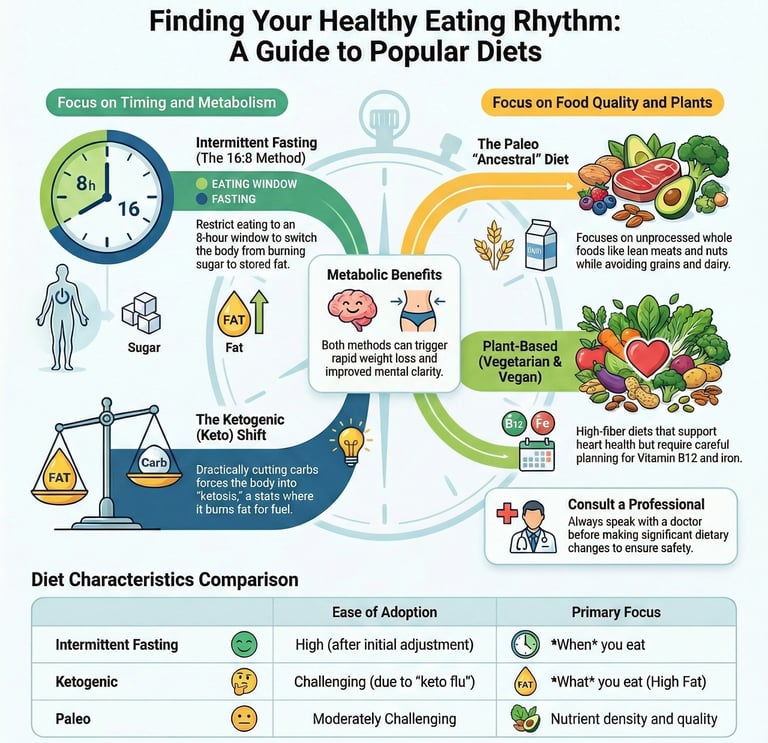Fasting for Health: A Simple Guide to Popular Eating Styles
Once you age, you need to be more concerned about your food intake versus your younger days. You may have heard the advice to ensure you are 75% full and to stop eating. Many folks are finding that when you eat, and what you eat, can make a big difference in how you feel, how much energy you have, and even your weight.
Let's look at a few popular ways people are approaching their food, including my personal favorite, Intermittent Fasting!
1. Intermittent Fasting (IF): Eating on a Schedule
This is all about when you eat. Instead of constantly snacking, you set a specific window each day for your meals, and then you "fast" (don't eat) for the rest of the time. The most common is the 16:8 method: you eat all your meals within an 8-hour window (like noon to 8 PM) and fast for 16 hours.
How it Works: Let's cut down on the complex science. In simple terms, this is how it works: When you don't eat for a while, your body gets a break from constantly digesting food. This allows it to switch from burning the sugar you just ate to burning its own stored fat for energy. Think of it as teaching your body to use its own fuel reserves!
My Experience: After my stroke, I found this incredibly helpful! I went from 70 kg to 60 kg in just two months. It felt surprisingly natural once my body got used to it, and seeing those results was a huge motivator.
Good Points: It's simple – no complicated calorie counting or strict food lists. It can really help with weight loss and make you feel more energetic and clear-headed.
Things to Watch Out For: You might feel hungry at first as your body adjusts, but this usually passes. It can also be a bit tricky to manage when eating out with friends or family.
Ease: High, once you get past the first few days of adjustment.
Speed: Can work quite quickly for weight loss, as I experienced personally.
2. The Ketogenic (Keto) Diet: Go for the Fat!
Keto is about what you eat. You drastically cut down on carbs (like bread, pasta, sugary foods) and eat lots of healthy fats and moderate protein.
How it Works: Your body switches from burning sugar to burning fat for fuel, a state called "ketosis."
Good Points: Can lead to quick weight loss and help manage blood sugar. Many feel full and focused.
Things to Watch Out For: The "keto flu" (feeling tired, headachey) can happen at first. It's very strict, cutting out many common foods.
Ease: Challenging at first, as it requires big changes to your usual meals.
Speed: Weight loss can be fast initially, then steady.
3. The Paleo Diet: Eat Like Our Ancestors!
Paleo focuses on eating foods that were available to humans before farming began. Think natural, unprocessed foods.
How it Works: You eat lean meats, fish, fruits, vegetables, nuts, and seeds. You avoid grains, beans, dairy, and processed foods.
Good Points: Encourages lots of fresh, whole foods. Cuts out unhealthy processed ingredients and added sugars. Can help with weight loss.
Things to Watch Out For: Can be quite restrictive, as it cuts out entire food groups like grains and dairy. Might be more expensive.
Ease: Moderately challenging, as it's a big shift from modern diets.
Speed: Weight loss is usually steady.
4. Vegetarian & Vegan Diets: All About Plants!
These diets focus on plant-based foods. Vegetarians avoid meat and fish but might eat dairy and eggs. Vegans avoid ALL animal products (meat, dairy, eggs, honey).
How it Works: You fill your plate with fruits, vegetables, grains, beans, nuts, and seeds.
Good Points: Often great for heart health and can lower the risk of certain diseases. High in fiber, which is good for digestion.
Things to Watch Out For: Especially for vegans, you need to plan carefully to get enough Vitamin B12, iron, and other important nutrients.
Ease: Becoming vegetarian can be quite easy. Going fully vegan needs more planning and learning.
Speed: Weight loss is typically gradual and depends on your food choices.
No matter which path you consider, remember: your body is unique! What works wonders for one person might not be right for another. Always listen to your body, and if you're thinking about making big changes to your diet, it's always best to chat with your doctor or a qualified nutritionist first. They can help you find the safest and most effective way to reach your health goals!
Disclaimer: This article is for informational purposes only and is not a substitute for professional medical advice, diagnosis, or treatment. Always seek the advice of a qualified healthcare professional with any questions you may have regarding a medical condition.



